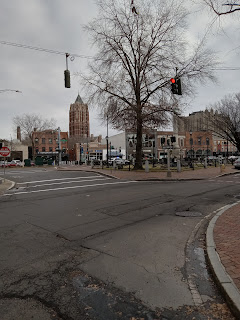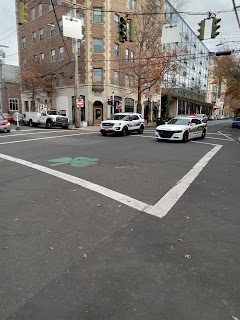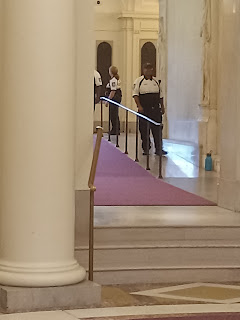Academia is its own sort of community, with its own distinctive culture. A university campus is not akin to a small town. To treat a campus as such, and thus to allow universities to have their own police departments rather than security guards, evinces a category mistake and presents issues of political legitimacy. The U.S. Constitution gives police power to the state governments, rather than to private companies and non-profit private organizations. Secuity guards, not police employees, belong to the categories of companies and non-profit organizations, both of which being qualitatively different than governments or states. Hence the matter of legitimacy should be raised when one organization, such as Yale, presumes not only to have its own private police force, but also to use it (and its security guards) to enforce local laws and university regulations off campus. When a university, again referring here to Yale, saturates its campus with police cars with emergency-alert blue-and-red lights blazing on top and headlights constantly and pensively on, and adds security guards on virtually every corner as if according to a military-style command coverage of the entire campus and beyond, the passive aggression and tacit message of deep distrust subtly undercut academic pursuits and the related psychological stamina of students, faculty, and even alumni who are auditing courses or conducting research as scholars "in residence." The saturated presence of pensive guns and distrustful staring eviscerates an anademic atmosphere of peace and tranquilly, and thus subtly eclipses academic learning and teaching. An academic atmosphere is vital to a college and even a large university so students and faculty can feel free to take ideas to their limits without fear of intimidation and being distrusted so. A pathological weaponizing of distrust is harmful even though the victims don't realize that they are being victimized. I contend that the unbiquitous, constant surveillance is unethical, and furthermore that university administrations that unfairly inflict such an aggressive culture of distrust should be held accountable externally by governments and internally through boards of directors and pressure from alumni. Paranoia is at the root of this type of dysfunctional organizational culture, such as existed at Yale as of 2023. The extreme distrust backed up by hostile staring, flashing lights, and even guns ought to be flagged as toxic and unethical.
Returning to Yale as an
alumnus scholar-in-residence in 2023 after 25 years, I was almost immediately
taken back by the sheer saturation of the campus by the university’s private
police force and security employees; notwithstanding all this, New Haven police
cars could be seen patrolling the campus and its periphery. The students were aware
of the “over-kill”—“They’re everywhere,” more than one student confided to me
in an accurate tone of fatalism. When I was a student, the “Unibomber” struck,
and even that did not turn the campus into a fortification. Perhaps the most
glaring indication of the pathological lapse in judgment on excessiveness was
the constancy of bright red and blue lights on top of the police cars and the
searing bright yellow spread of lights on top of the security cars. The lapse
involves not grasping that to routinize markers of emergency impairs to a
significant degree the academic atmosphere on the campus. Ethically, the harm from
subjecting students, faculty and alumni to the continuous lights and surveillance
was conveniently ignored by the Yale Corporation. Studying in a (private) police
state on steroids is contrary to common sense and academic freedom; the weight
of the omnipresent passive aggression was real yet remained far from fully
realized by the victims.
Not even a week into the fall 2023 term, I was immediately struck by the sheer bravado of a security guard who followed me through one of the academic buildings on a day when classes were in session. His lack of respect for, and even antipathy towards Yalies was obvious in his facial expressions as he followed me and even evesdropped in the hallway outside of a small office where I had gone to speak with an administrator, who, by the way, reported the predator to a dean. After I left the office, the guard followed me out of the building. I returned to the office to report this behavior to the administrator, but was surprised to find the guard in that office lying that he had just been trying to keep everyone safe! Seeing me at the doorway, he shut the door on me. After he left the office, the administrator kindly walked me out of the building; she assured me that she would report the man. By the time we reached the entrance, the guard was on his phone outside. Seeing me leaving, he turned around and watched me, even when I was at a distance.
In September, 2023, that security guard followed me inside the building. Profiling alumni is not the fundraising strategy that I would recommend.
About a month later, I was
again taken back when another security in the same building demanded in an angry
tone where I was going. I, like everyone else, was headed to a stairway that obvious
led to the screening rooms, where a movie was to be shown. I reported him to
the same administrator, who in turn reported that bully to the same dean. Even
that was insufficient to restrain the attack dogs, for two months later, I was again
subject to yet another security guard menacingly singling me out after I had
left the screening for a film. I returned to the same administrator, who again
promised to report that resentful, predatory man to the same dean.
Clearly, Yale’s security employees were not members of the Yale community; in fact, they were hostile to it (or they feel entitled not to hide their feelings); rather than being oriented to protecting us, they must have viewed themselves as police and we were all potential suspects. I do suspect that word had gotten around that I had complained about having been hounded and the employees in Yale’s security department felt they could get away with harassing me. They may have been right because at least one dean had failed to bring accountability to Yale’s security department regarding how its employees treat Yalies (or at least alumni scholars in residence). Having not said a word to any of the predators I encountered, I naturally felt apprehensive on account of their irrational psychology.



The first two pictures above show Yale police with their patrol lights on when the university was closed for Christmas. The bottom two pictures show a local police car was also "flashing" on the campus. A lot of alert-lights for an empty campus. This is yet another indication of "over-kill" (i.e., paranoia).
At the beginning of the fall, 2023 semester, members of the university's police union handed out fliers to freshmen as they were moving in so to intimidate and frighten them. Yale police employees, whose union was in a dispute with the university, handed out fliers that were clearly intended to intimidate and scare 18 year-olds as a passive-aggressive way to get back at the university for the latest contract proposal. The leader of the police union lied, or was pathological, that the flier merely "informed" students for their own safety.
The flier uses hyperbole in claiming to be a SURVIVAL guide. Hardly objective (not to mention professional), the first sentence reads, "The incidence of crime and violence in New Haven is shockingly high, and its getting worse." That was not true of New Haven near the campus. The flier then cites some statistics that are overly pessimistic. "Nevertheless, some Yalies do manage to survive New Haven and even retain their personal property." Some Yalies manage to survive? At this point in reading the flier, I became concerned that its authors were being allowed to carry guns, given the emotional state and immaturity that leaps off the page. I would not be surprised in the least if the security guard who obsessionally watched and followed me without any rational rationale had the sort of pathology that was responsible for such an immature and erroneous flier of passive-aggression.
The Yale police employees who drew up and passed out the flier were upset at Yale's latest offer to the employees' union, so maybe the employees were taking out their anger on innocent young students or sending a Yale a message, like a horse's head in a bed in The Godfather. Similarly, the predator who stalked me may have been acting on his union's ploy to send the Yale corporation a message by harassing alumni. Of course, the stalker could simply have had emotional problems and was abusing the authority vested in him. Or maybe he was a police flunky working security at a university. That such a human being and Yale's police employees who devised and passed out the bizarre flier were working for a private corporation ought to raise red flags among people who know that under the U.S. Constitution, the police power resides with the state governments, rather than private companies and organizations, and that the latter can easily exploit an institutional conflict of interest in the pleasure that comes with having police power.
Therefore, Yale having its own police power is itself problematic, as is its hiring process; that the university presumes the right to use its passive-aggressive police department locally, well off the university's campus, raises an especially red flag. In December, 2023, Yale announced in a news release that its police could enforce university regulations off campus. In the midst of Israel's military attacks in Gaza, a Palestine flag was draped on a menorah off Yale’s campus, literally on a public square, Yale’s administration felt the need to become involved, even notifying the New Haven police as if the mayor’s office could not handle that task. Yale also indicated that its own police department might investigate the incident. The university even stated that its “regulations reach conduct occurring on or off campus that imperils the integrity and values of the Yale community.”[1] This is an open door, for values is a vague term that can mean practically anything, for a university to assume the power of a city government. That Yale contacted the New Haven police department is ironic because Yale’s private police cars regularly patrolled beyond the university’s property, even regularly arresting local residents for offensives unrelated to the university. One local resident who worked at a local hospital told me that Yale’s private police force regularly arrests local residents coming out of bars. That they might be drunk and hit Yale students is not a sufficient (contingent, indirect) connection to justify giving the Yale Corporation police power in a city.
A series of photos showing Yale's private police department patrolling off campus, even being duplicated by Yale security guards (off-campus). The last two photos follow a Yale police car going around a city block that is not contiguous with the campus. As the photo of a Yale police car driving next to a New Haven police car, Yale's patrols off its property duplicate the jurisdiction of the New Haven police, hence subjecting residents to two police forces.
I submit that the overreach both regarding Yale's presumed reach of its regulations and its hyperextended coverage of its police are in need of a court challenge on constitutional grounds, as the U.S. Constitution gives police powers to the state governments rather than to private companies and private non-profit organizations. Astonishingly, even Yale’s security guards felt entitled to patrol local streets not bordering campus as if an organization’s security guards were police.
Besides capitulating to over-protective parents of the young students in Yale College, the extent of the ubiquitous police and security (two departments!) on campus points back to a psychological paranoia, which warps judgment. Attending a university event that was open to the public during the fall, 2023 semester, I was not the only attendee who was stunned by the police presence.
Both in entering the event then immediately afterward at the reception, the presence of security employees and Yale police dominated, even within the reception hall in spite of the formidable presence just outside the hall. There were even undercover Yale police wearing suites. Uniformed police were even helping themselves to food! The university's administration was present, and yet they were utterly purblind as to how oppressive the presence of weapons and uniforms were to the guests. The administrators' warped perception and judgment stem, I submit, from a psychological paranoia.
Police State 101: A Yale Primer
This undercover police employee was hostile when I, not knowing his real identity, spoke with him. Was it really necessary, given the lack of celebrities at the reception, for undercover police to be in the reception hall, considering that the hall was "surrounded"?
1. “Yale Statement on Desecration of a Menorah,” YaleNews, December 10, 2023.

















































.jpg)

.jpg)





